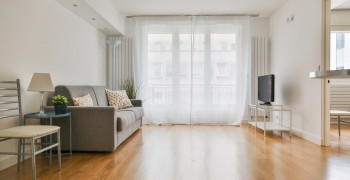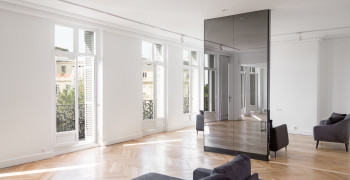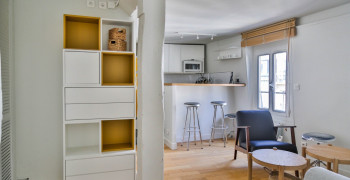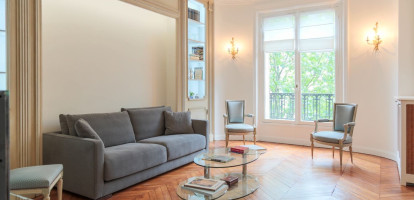Renovating a rented apartment as a property owner requires careful planning to ensure the process is efficient, professional, and fully compliant with French regulations. In this article, we’ll dive into the essential rules for renovating a rented property in France and share practical tips to help you navigate the process smoothly while maintaining compliance and enhancing the value of your investment.
Guidelines for Landlords When Renovating a Rented Apartment
Planning renovations in a rented apartment requires clear communication and careful coordination with the tenant. Follow these steps on how to organize renovations in a rented apartment to ensure a smooth process:
1. Notify the Tenant in Advance
Landlords must inform tenants about planned renovations ahead of time. Provide all the necessary details, including:
- Type of Work: Clearly explain the nature of the renovations.
- Start Date: Specify when the work is scheduled to begin.
- Duration: Give an estimated timeline for the project.
2. Use Written Communication
It’s best to make the work request in writing. You can either give it to the tenant in person or send it by registered mail with proof of receipt to keep a clear record.
3. Schedule Mutually Convenient Days and Times
Coordinate directly with the tenant to agree on days and times that work for both parties.
Important Note: Renovations cannot take place on Saturdays, Sundays, or public holidays without the tenant’s explicit consent.
4. Address Potential Noise or Disturbance Issues
If the renovations are noisy, anticipate possible complaints from other residents or neighbors. Plan accordingly to minimize inconvenience.
By following these steps, landlords can ensure a seamless renovation process while respecting tenants’ rights and maintaining good relations with other residents.

What renovation work can the owner do while the apartment is being rented?
While the tenant occupies the apartment or house, the French law allows the owner to do only specific work strictly for the following purposes:
- Keeping the property in good condition and carrying out routine maintenance,
- Bringing the property up to legal standards of decency,
- Improving energy efficiency,
- Improving the common or private areas of the building.
Apart from these works, the owner cannot force the tenant to accept any renovation work. Tenants have the right to refuse access to professionals and owners to retain peaceful enjoyment of their dwelling.
If the owner wishes to undertake work that does not fall into the above categories, they must ask for their tenant's agreement.
Tenants' Rights and Responsibilities During Renovations
When a landlord undertakes renovations in a rented property, the tenant is entitled to specific rights and protections to ensure minimal disruption.
Compensation for Significant Disruption
If renovations cause major inconvenience, such as making one or more rooms inaccessible, the tenant is entitled to compensation. For renovations lasting longer than three weeks (21 days), the landlord must adjust the rent based on the duration of the work and its impact on the tenant’s use of the property.
Major Renovations That Make the Apartment Uninhabitable
If renovations make the property completely uninhabitable for some time, the tenant can ask the court to cancel their lease without giving notice. They can also require the landlord to provide alternative housing during the renovations.
To avoid such conflicts, it is essential to plan the work carefully and maintain open communication with the tenant throughout the process.
No Mandatory Compensation for Minor Renovations
For work lasting less than 21 days, the landlord is not legally required to provide compensation.
However, if the renovations are prolonged or render the property uninhabitable, the tenant has the right to:
- Seek a court-approved lease termination without notice.
- Request temporary alternative housing from the landlord for the duration of the work.
How to Determine Compensation for Tenants During Renovations?
Suppose renovations make using a room lasting longer than three weeks difficult or impossible. In that case, the rent must be adjusted proportionally to the duration of the work and the portion of the property that cannot be used. Generally, a 20% to 30% rent reduction is considered reasonable.
Example 1: In a two-bedroom apartment (T3) where one bedroom is inaccessible for several weeks, a tenant paying €3,000 per month could receive a 30% reduction, lowering the rent to €2,100.
Example 2: If a property is 100 m² and a 25 m² room cannot be used for a month due to renovations, the rent can be reduced proportionally. For example, if the monthly rent is €3,000, the tenant would pay €2,250.
Landlords and tenants are encouraged to negotiate a fair agreement. A judge may be consulted to determine the appropriate compensation if no consensus is reached.
Avoiding Disputes and Ensuring Fair Treatment
Landlords often wait to start major renovations until the property is vacant to make the process smoother. However, if the work needs to happen while the tenant is still living there, the tenant should be treated fairly and may receive compensation for any significant disruptions.
Paris Rental offers a comprehensive rental management service to support property owners throughout every rental journey. From assisting with renovations and ensuring legal compliance to finding reliable tenants and managing day-to-day operations, we handle all the details so you can enjoy peace of mind.
Editor: Siyi CHEN



 Français
Français

















